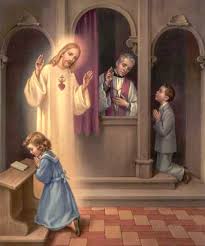
As Holy Week begins, not least of my emotions is gratitude. Thankfulness for this God that came down from Heaven to save me; that emptied Himself, and took the form of a slave, to give me eternal life. And for you too; if Jesus knew that you yourself were the only person that would ever be saved by His passion and death, He would still do it. Each of us individually is worth all that He endured. Remember this, the next time you feel insignificant or invisible: the same God that created the world and everything in it feels that you yourself are worth all that He did!
My life changed when I began concentrating on thankfulness in my morning prayers. Each day I try to focus on all I have to be thankful for. I always run out of time; my blessings overwhelm my ability to count them. Consciously feeling gratitude makes a tremendous difference in my life. It helps correct my natural tendency to focus on everything that's wrong. I hope it's made me more positive and easier to be around.
My blessings come in three kinds:
- First are the big-ticket items, the ones so huge they tend to fade into the background; my family, the Church, the faith, living in the United States, God's love for me, the angels and saints.... Like I said, my blessings overflow my time to count them.
- Second are the daily benefits, whatever happened yesterday or today: recovering from a cold, surviving another day at work, reading a good book, the coming of springtime
- Third is the hardest. St. Paul tells us to give thanks for everything ("Always rejoice. Pray without ceasing. In all things give thanks; for this is the will of God in Christ Jesus concerning you all." - 1 Thessalonians 5:16-18). "All things" is unqualified. I have to give thanks for the very things I really don't want to be thankful for. The battle I lost at work; my dog's sore back; the temptations I suffer; the hurt inflicted on me by others, and the hurt I inflict on others. All these come under God's providence. And a funny thing happens when I truly give thanks for these difficulties: their sting is lessened, and my trust in God increases.
Most of all, gratitude is one of the best gifts we can offer God for all He has given to us. When we thank God, we acknowledge our dependence on Him and give Him glory. Remember the ten lepers who were healed? Only one of those ten took the time to thank Jesus for that tremendous gift. I am most deeply and humbly grateful to God for the opportunity to pray to Him every day.


